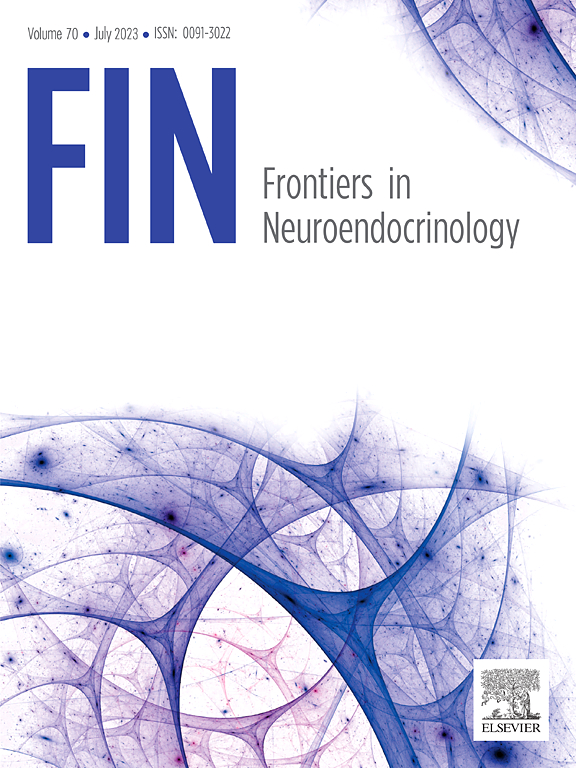Neurosteroid replacement approaches for improving outcomes after compromised pregnancies and preterm birth
IF 6.7
1区 医学
Q1 ENDOCRINOLOGY & METABOLISM
引用次数: 0
Abstract
The levels of the key neurosteroid of pregnancy, allopregnanolone, are very high in the fetal and maternal brain compared to after birth. These levels are maintained by the placenta which forms a placental connection to fetal brain development. Maternal stresses depress placental synthesis resulting in a fall in allopregnanolone levels leading to deficits in myelination that continue into childhood. This contributes to an increased incidence of behavioural disorders. Supplementing neurosteroid action with allopregnanolone analogues or raising endogenous production with mitochondrial translocator protein (TSPO) ligands reverses these deficits. Preterm birth leads to an early dramatic loss of neurosteroid support for brain development leading to marked deficits in myelination and susceptibility to hypoxic-ischaemic injury. Postnatal treatment with the allopregnanolone analogue ganaxolone improves myelination and reduces hyperactive behaviour. TSPO ligands such as emapunil have been shown to improve oligodendrocyte maturation. These findings support the use of allopregnanolone supplementation approaches after pregnancy compromises to improve outcome.
神经类固醇替代方法改善受损妊娠和早产后的结局。
与出生后相比,胎儿和母亲大脑中关键的神经类固醇异孕酮的水平非常高。这些水平是由胎盘维持的,胎盘与胎儿大脑发育形成联系。母体压力抑制胎盘合成,导致异孕酮水平下降,导致髓鞘形成缺陷,并持续到儿童时期。这导致行为障碍的发生率增加。用异孕酮类似物补充神经类固醇作用或用线粒体转运蛋白(TSPO)配体提高内源性生产可逆转这些缺陷。早产导致早期大脑发育中神经类固醇支持的显著丧失,导致髓鞘形成的明显缺陷和对缺氧缺血性损伤的易感性。产后用异孕酮类似物加那洛酮治疗可改善髓鞘形成并减少多动行为。TSPO配体如emapunil已被证明可以促进少突胶质细胞成熟。这些发现支持在妊娠妥协后使用异孕醇酮补充方法来改善结果。
本文章由计算机程序翻译,如有差异,请以英文原文为准。
求助全文
约1分钟内获得全文
求助全文
来源期刊

Frontiers in Neuroendocrinology
医学-内分泌学与代谢
CiteScore
13.30
自引率
6.80%
发文量
62
审稿时长
68 days
期刊介绍:
Frontiers in Neuroendocrinology (FIN) publishes a wide range of informative articles including comprehensive reviews, systematic reviews, opinion pieces, and meta-analyses. While the majority of reviews are invited, we also embrace unsolicited reviews and meta-analyses, as well as proposals for thematic special issues, provided they meet our rigorous quality standards. In addition, we encourage authors to submit commentaries that concisely present fresh ideas or offer further analysis to delve deeper into the implications of an article published in our journal.
 求助内容:
求助内容: 应助结果提醒方式:
应助结果提醒方式:


